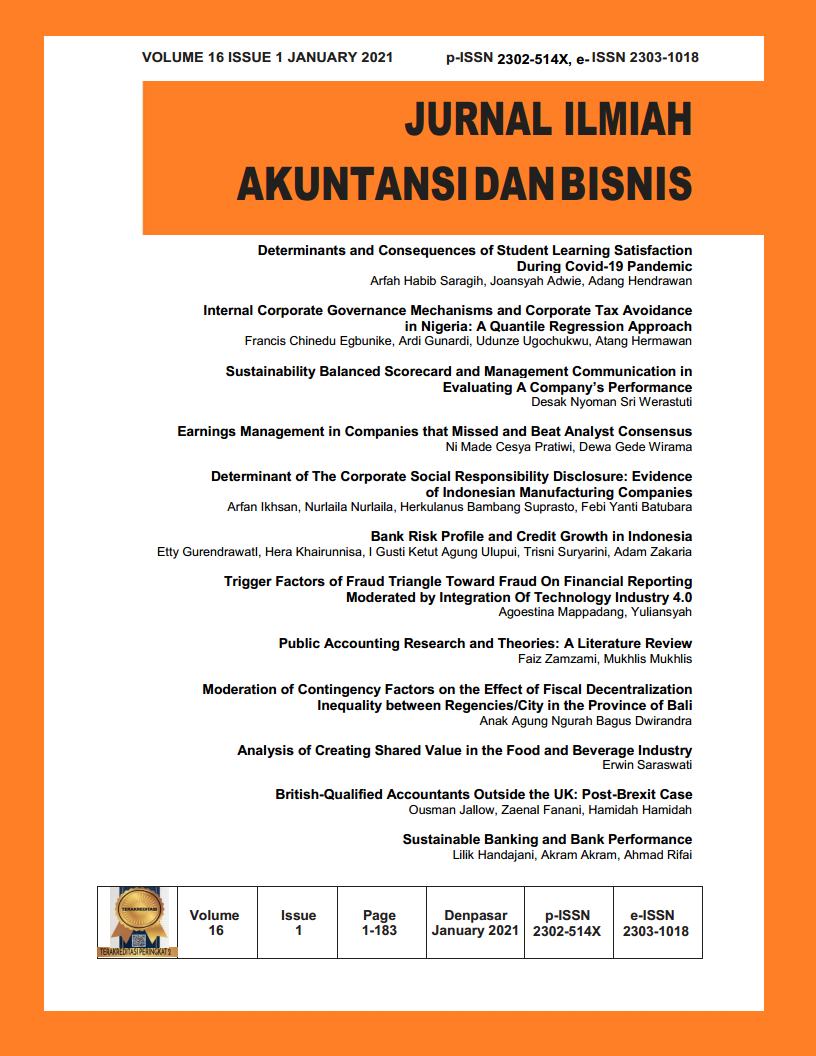Analysis of Creating Shared Value in the Food and Beverage Industry
Abstract
This study analyzed the creating shared value (CSV) concept in the food and beverage industry using descriptive quantitative method. CSV is the practice of creating corporate policies and practices that enhance a company's competitiveness while simultaneously advancing the social and economic conditions in communities in which the company sells and operates. It is considered an enhanced version of CSR, which emphasizes the synchronization between social and economic progress. Thirteen listed food and beverage companies in Indonesia from 2015 to 2017 were analyzed, resulting in 39 firm-year observations. We conducted a content analysis on the sample CSR reports using Drozdz et al.’s (2015) indicators. Our analysis showed that companies created value mostly for their customers, since customers are especially important for these firms because of their prominent nature. The result supports the legitimacy theory, which stated that companies need to align their operations with the expectations of the society they operate in order to survive. In addition, the result suggests that food and beverage companies need to start creating more shared values for the society, their employees, the environment, and their suppliers. The CSV concept can be a strategic practice for companies.
Keywords: fiscal decentralization, inequality between regions/cities, regional spending, private investment, general allocation funds
Downloads
References
Crane, A., Palazzo, G., Spence, L. J., & Matten, D. (2014). Contesting the Value of “ Creating Shared Value .” California Management Review, 56(2), 130–154.
Deegan, C., Rankin, M., & Tobin, J. (2002). An examination of the corporate social and environmental disclosures of BHP from 1983‐1997. Accounting, Auditing & Accountability Journal, 15(3), 312–343. https://doi.org/10.1108/09513570210435861
Deegan, C., Unerman, J. (2008). Financial Accounting Theory European Edition. UK: McGraw-Hill.
Drozdz, S., Dufwa, M., Søilen, K. S., & Meconnen, R. (2015). An Assessment of Customer Shared Value in the Restaurant Industry – a Survey from Sweden. Theoretical and Applied Economics, XXII(4605), 85–98. Retrieved from http://store.ectap.ro/articole/1133.pdf
Kreckova, Z. (2015). Corporate Response to Concept of Shared Value. European Scientific Journal, 11(22), 36–45.
Lapiņa, I., Borkus, I., & Stariņeca, O. (2012). Corporate Social Responsibility and Creating Shared Value : Case of Latvia. International Journal of Social, Behavioral, Educaton, Economic, Business and Industrial Engineering, 6(8), 2228–2234.
Macagno, T., 2013. A Model for Managing Corporate Sustainability. Business and Society Review. 118(2). pp. 223-252.
Moczadlo, R. (2015). Creating Competitive Advantages – The European CSR-Strategy Compared with Porter’s and Kramer’s Shared Value. Ekonomski Vjesnik, XXVIII(1), 243–256.
Pfitzer, M., Bockstette, V., & Stamp, M. (2013). Innovating for Shared Value. In Harvard Business Review (pp. 3–9).
Porter, M. E., & Kramer, M. R. (2006). Strategy & Society: The Link Between Competitive Advantage and Corporate Social Responsibility. In Harvard Business Review (pp. 78–93).
Porter, M.E. and Kramer, M.R. (2011). Creating Shared Value. In Harvard Business Review. 89(1-2). pp. 62-77.
Prasertsang, S. (2016). A Conceptual Model of Creating Shared Value Strategy, Business Competitiveness. In The 2016 WEI International Academic Conference (pp. 135–138).
Putri, A. P., & Triyono, A. (2020). Community , Dialog and Technology - Maximizing Creating Shared Value ( CSV ) Nestle Indonesia. Advances in Social Science, Education and Humanities Research, 459(Proceedings of the 2nd Jogjakarta Communication Conference (JCC 2020)), 35–40.
Scagnelli, S. D., & Cisi, M. (2014). Approaches to Shared Value Creation : CSR 2 . 0 or Something More ? Insights and Issues about the New Sustainability Perspective, 5(2), 10–12. https://doi.org/10.4172/2151-6219.1000e104
Setiawan, M., & Lansink, A. G. J. M. O. (2018). Dynamic technical inefficiency and industrial concentration in the Indonesian food and beverages industry. British Food Journal, 120(1), 108–119. https://doi.org/10.1108/BFJ-04-2017-0226
Sinthupundaja, J., & Kohda, Y. (2019). Effects of corporate social responsibility and creating shared value on sustainability. In Green Business: Concepts, Methodologies, Tools, and Applications (pp. 1272-1284). IGI Global.
Spitzeck, H., & Chapman, S. (2012). Academic paper Creating shared value as a differentiation strategy – the example of BASF in Brazil. Corporate Governance, 12(4), 499–513. https://doi.org/10.1108/14720701211267838




















